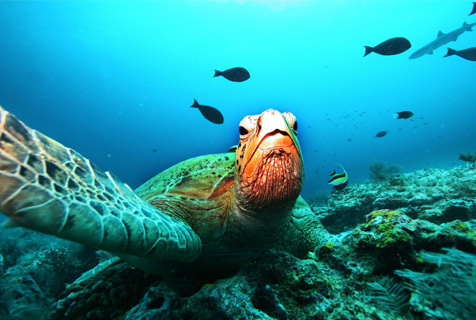Pacific focusses on biodiversity in 2010

APIA- 2010 has been designated the International Year of Biodiversity by the United Nations. The Year recognises the internationally agreed “2010 Biodiversity Target”, which aimed to significantly reduce the rate of biodiversity loss by 2010. The 2010 Biodiversity Target was agreed to by world leaders at the World Summit on Sustainable Development in 2002.
Speaking during the launch and unveiling of the Pacific Biodiversity logo, Acting Director for SPREP, Mr Kosi Latu, stated that celebrating the Year was a way of recognizing the value of biodiversity to us as island dwelling people.
“The slogan, Value Island Biodiversity, It’s Our Life says it all,” he said. “All humans, no matter where we live, are totally dependent on biodiversity – on nature and natural systems.”
“We rely on nature for food, clothing, pharmaceuticals and for our overall well-being,” said Mr Latu. “Even though we might be able to purchase many things from overseas, we are still reliant on fuel and money, which we can only derive from our natural resources.”
Biodiversity is a term used to refer to all living things and living systems on the planet. The diverse range of plants, animals and micro-organisms forms the basis for human survival and well-being. Not only do humans rely on biodiversity for our food and basic needs, but we also derive our cultural identities and traditions from our biodiversity.
“What we eat and how we live have been determined by what is available in our environment. Our traditional medicines have been derived directly from nature; and our songs and dances have been fashioned by our natural surroundings,” said Mr Latu.
The Pacific region contains some of the most unique species on Earth, with large numbers of plants and animals occurring nowhere else on the planet. Papua New Guinea , for example, contains over 5% of the world’s biodiversity concentrated in less than 1% of the world’s total land area. The Western Pacific is acknowledged to have the highest marine diversity in the world with up to 3,000 species found on a single reef. Our region also has three globally recognised terrestrial biodiversity “hotspots” or areas of high biodiversity that are under threat. These hotspots occur in the Melanesian islands, New Caledonia and Polynesia-Micronesia.
“Without this myriad of corals, birds, fish, trees and flowers, our islands would not be known for our bright colours, our joyous songs, graceful dances and our own unique cultural identities of which we are so proud,” said François Martel, Executive Director of Conservation International’s Pacific Islands Program, based in Apia. “We must get serious about biodiversity conservation if we are to continue to benefit from it”’.
Most Pacific island economies are hugely dependent on nature-based industries such as tourism, fisheries, forestry and agriculture – many of which, if improperly managed, contribute to severe loss of biodiversity in the region. Mass logging and forest clearing, unplanned development, overfishing, coastal and coral reef destruction and poor waste management are all ways in which natural ecosystems are gradually destroyed and loss of biodiversity results.
“There is a need for stronger policies and development and implementation of legislation to help ensure we use and manage our natural resources better,” said Mr Martel.
Activities during the Year of Biodiversity will focus on such policies and systems as well as profiling good practices in biodiversity conservation. Countries are also committing to developing and implementing their national biodiversity strategies and action plans and to integrating these into national development plans.
“SPREP will work with its Pacific island members and partners to raise awareness at all levels of the value of biodiversity – not just in economic or monetary terms but also valuing biodiversity for its intrinsic worth in terms of cultural, physical and emotional well-being,” explained Stuart Chape , Manager of SPREP’s Island Ecosystems Programme, which has key responsibility for coordinating the Year.
-Press Release by SPREP Photo by Allianz
